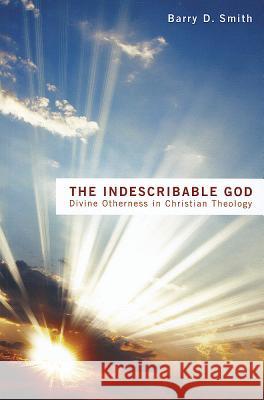The Indescribable God: Divine Otherness in Christian Theology » książka
The Indescribable God: Divine Otherness in Christian Theology
ISBN-13: 9781620321041 / Angielski / Miękka / 2012 / 168 str.
The Indescribable God: Divine Otherness in Christian Theology
ISBN-13: 9781620321041 / Angielski / Miękka / 2012 / 168 str.
(netto: 110,98 VAT: 5%)
Najniższa cena z 30 dni: 114,94
ok. 16-18 dni roboczych.
Darmowa dostawa!
Synopsis: The God of classical Christian faith is radically transcendent--utterly beyond understanding and words. So if God is to be known it must be in the luminous darkness of unknowing. Drawing on a wide range of primary sources--biblical, patristic, and medieval--Barry D. Smith identifies and explores seven ways of expressing the otherness of God in classical Christian thinking. By allowing historical theologians to speak for themselves, he shows how an aversion to ontotheology long precedes postmodernism. The book first lays out the Old Testament and New Testament foundations for subsequent Christian reflections on divine transcendence. These were the teachings that the early church assumed and, with the assistance of Greek philosophy, further refined with their own set of apophatic conceptual tools. The main focus of the book is a sevenfold exposition of that theological refinement. Smith concludes by looking towards possible future theological developments within this apophatic tradition. Drawing on the theological methodology of historic Christianity, he indicates how a synthesis of the biblical teaching on the otherness of God with philosophical traditions other than those inherited from Greek philosophy is also possible. Endorsements: "The process by which Greek thought forms were used by Christian thinkers was eclectic and nuanced. The great value of The Indescribable God is it pays full attention both to the ideas of God's incomprehensibility in Scripture and to the primary texts of Christian thinkers from the early church fathers to Calvin and beyond, letting both kinds of sources speak for themselves. The result is a first-class tool for the student of Christian doctrine." --Paul Helm, Teaching Fellow, Regent College Author Biography: Barry D. Smith is Professor of Philosophy and Religious Studies at Crandall University in New Brunswick, Canada. He is the author of Jesus' Twofold Teaching about the Kingdom of God (2009) and What Must We Do to Be Saved? Paul Parts Company with His Jewish Heritage (2007).
Synopsis:The God of classical Christian faith is radically transcendent--utterly beyond understanding and words. So if God is to be known it must be in the luminous darkness of unknowing.Drawing on a wide range of primary sources--biblical, patristic, and medieval--Barry D. Smith identifies and explores seven ways of expressing the otherness of God in classical Christian thinking. By allowing historical theologians to speak for themselves, he shows how an aversion to ontotheology long precedes postmodernism.The book first lays out the Old Testament and New Testament foundations for subsequent Christian reflections on divine transcendence. These were the teachings that the early church assumed and, with the assistance of Greek philosophy, further refined with their own set of apophatic conceptual tools. The main focus of the book is a sevenfold exposition of that theological refinement. Smith concludes by looking towards possible future theological developments within this apophatic tradition. Drawing on the theological methodology of historic Christianity, he indicates how a synthesis of the biblical teaching on the otherness of God with philosophical traditions other than those inherited from Greek philosophy is also possible. Endorsements:"The process by which Greek thought forms were used by Christian thinkers was eclectic and nuanced. The great value of The Indescribable God is it pays full attention both to the ideas of Gods incomprehensibility in Scripture and to the primary texts of Christian thinkers from the early church fathers to Calvin and beyond, letting both kinds of sources speak for themselves. The result is a first-class tool for the student of Christian doctrine."--Paul Helm, Teaching Fellow, Regent CollegeAuthor Biography:Barry D. Smith is Professor of Philosophy and Religious Studies at Crandall University in New Brunswick, Canada. He is the author of Jesus Twofold Teaching about the Kingdom of God (2009) and What Must We Do to Be Saved? Paul Parts Company with His Jewish Heritage (2007).











